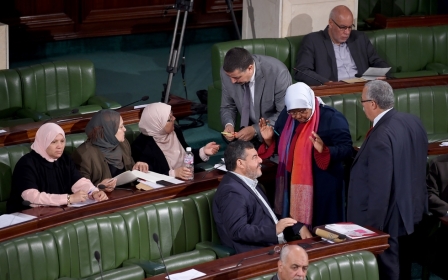Tunisia's Nobel prize-winning union meets Bashar al-Assad

A delegation from the Nobel-prize winning Tunisian General Labour Union (UGTT) has sparked controversy after a delegation of leaders met Syrian President Bashar al-Assad.
According to a statement put out by the union, a delegation chaired by general secretary Bouali M'Barki and composed of 21 trade union leaders, met Assad in Damascus on Saturday.
It said the visit aimed to show solidarity with the Syrian people in their "war against terrorism".
More than 3,000 Tunisians have reportedly left the country to join the Islamic State (IS) group in Iraq and Syria, the largest number from any single country.
Assad reportedly told the Tunisian delegation, however, that they should not feel responsible for militants fighting in Syria and that Syria's "position vis-a-vis Tunisia has not changed".
The UGTT has previously expressed opposition to foreign intervention in Syria - in April it condemned the US air strikes on the Khan Sheikhun airbase describing the Syrian civil war as “an internal conflict which can only be resolved by political means”.
They also called for opposition to “the policy of exporting terrorists from an Arab country to another for the sole purpose of sowing destruction”.
Translation: The UGTT, Nobel Peace Prize, pushes the limits of shame with this delegation which is going to meet Bashar al Assad
On 20 July, Tunisia's parliament failed to pass a motion to restore ties with Syria.
With 68 votes in favour, 27 abstentions and six against, the vote did not reach the 109 quorum required to validate it.
The wording of the motion described restoring relations with Syria as being "in line with the preamble to the constitution, which reaffirms Tunisia's belonging to the cultural level and the civilisation of the Arab and Islamic world, calling for national unity based on citizenship, brotherhood, solidarity and social justice, and for a Maghreb union as the first step towards Arab unity as well as complementariness with Islamic and African populations''.
In April, Tunisian President Beji Caid Essebsi said he was not opposed to restoring ties with Syria, but has generally wavered on committing to returning ambassadors, despite the revelation in January that Tunisia still maintained a security office in Damascus.
Tunisia originally severed ties with Syria in 2012 following demonstrations against the Assad government and the subsequent violent crackdown.
However, as early as 2015 there had been talk of restoring ties with the government particularly as a means of jointly combating the flow of militants.
In April that year, the then-foreign minister said it planned to reopen a consulate in Syria and offered to invite the Syrian ambassador back to Tunisia.
"We will not have an ambassador there, but Tunisia will open a consulate or put in place a charge d'affaires, and a Syria ambassador is welcome to Tunisia, if Syria wishes so," Foreign Minister Taieb Bakouch said.
The minister said a consular presence in Syria would help Tunisia glean information on Tunisians fighting alongside Islamist militants in Iraq and Syria and who officials fear will return to carry out attacks at home.
Despite the promise, the plan failed to materialise.
This article is available in French on Middle East Eye French edition.
Middle East Eye propose une couverture et une analyse indépendantes et incomparables du Moyen-Orient, de l’Afrique du Nord et d’autres régions du monde. Pour en savoir plus sur la reprise de ce contenu et les frais qui s’appliquent, veuillez remplir ce formulaire [en anglais]. Pour en savoir plus sur MEE, cliquez ici [en anglais].



